The Right/Wrong Mindset

[Editorial note: This article has been excerpted from the chapter entitled "Guilt-Based Culture" from the book Honor and Shame: Unlocking the Door by Roland Muller.]
Right versus wrong is the yardstick we use to measure everything in Western culture. We talk about the rightness and wrongness of someone else’s actions. We talk about things being “right for me.” We are obsessed with knowing our rights and exercising them. Our society spends countless hours and billions of dollars debating the wrongs of society. Is homosexuality right or wrong? Is spending billions on the military right or wrong? Is possession of drugs right or wrong? How about possession of nuclear bombs, or weapons of mass destruction?
Almost every major issue the West struggles with involves deciding whether something is right or wrong. We arrive at this basic tension in life because almost everything in our culture is evaluated in terms of guilt/innocence (innocence being something we define as being right or righteousness).
The pulls and demands of these two diametrically opposed forces dictate much of our western human behavior. Guilt can plague and haunt us, bringing fear and condemnation. We do everything we can to avoid being guilty. Psychologists spend a great deal of time helping people deal with guilt complexes.
Evangelicals in particular often live in circles governed by guilt principles based on the authority of the Bible. Outside of these circles, guilt is defined in many ways—public disapproval, trouble with the authorities, or being politically incorrect. Our understanding of right and wrong has a deep influence on western society.
At the other end of the spectrum, righteousness and innocence are the unspoken goal of our society. “I’m OK, you’re OK” is the situation we find most comfortable. All of us want being “as good as the next guy” to verify our innocence. If this is true, then we can get about our business of pursuing happiness and pleasure within the bounds of being OK and not guilty.
Most of us do what we can to avoid being guilty while at the same time exercising our rights. This guilt/innocence thinking is so ingrained in our society that most of us have immediate related reflexes to unexpected events.
What happens when the lifeguard blows his whistle? Everyone stops to see who is guilty. When we unintentionally run a red light, we may feel guilty. Or when Johnny is called to the principal's office the other children immediately wonder, “What did he do wrong?”
When sharing the gospel we usually start from the premise of guilt, as taught in Romans 3—all are guilty of breaking God’s law. In Western culture I’ve noticed several common reactions: “Well, I think I’m as good as the next fellow” or “I’ll take my chances.” Even people on the street immediately associate the Christian religion with guilt. A mosque in Canada once displayed a sign: “We accept everyone, and tell no one that he is a sinner.”
So much of our western thinking is wrapped up in guilt. Wars are justified on the basis of establishing guilt. During the opening days of the Gulf War, the American government spent many hours and millions of dollars evaluating whether Saddam Hussein was guilty. Establishing that he was guilty of atrocities made it “right” to take military action against him. Throughout the war, Americans continued to focus on Mr. Hussein’s deranged mental state and irrational actions. All of this helped justify the war. In fact, all during the history of western civilizations, wars have had to be justified, and each side identifies the other as being the ‘bad guys.’
The flip side of guilt is innocence, righteousness, and exercising rights. As I mentioned, “I’m OK, you’re OK” is an important philosophy in our culture. In order for us to not have to point our finger at people, we continue to expand the limits of what is acceptable activity. By making homosexuality acceptable, we help thousands of people avoid feeling guilty. This alone is enough to convince many people in our society that it’s OK for people to be homosexual. In fact, almost anything is tolerated as long as it doesn’t hurt another person.
I have been surprised to discover that many people in our western world believe that our fixation with right and wrong is not only normal, but also the only correct way to think. They assume that anyone who does not think in these terms does not think rationally or logically.
Furthermore, there are many Christians who believe that a culture that is based on right and wrong is based on Judeo-Christian principles and therefore is correct. I’ve noticed time and time again that this objection is quickly withdrawn as we look into the origins of our guilt-based culture and ask ourselves honestly if this is the only valid pattern set down in the scriptures.








comments